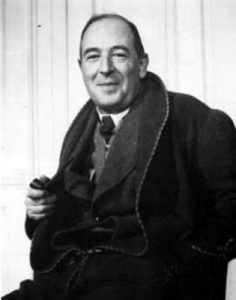 All those essays by C. S. Lewis contain nuggets that can be missed when we focus only on his more famous works. For instance, in “The Efficacy of Prayer,” written in 1959, he provides many thoughtful insights:
All those essays by C. S. Lewis contain nuggets that can be missed when we focus only on his more famous works. For instance, in “The Efficacy of Prayer,” written in 1959, he provides many thoughtful insights:
Prayer is either a sheer illusion or a personal contact between embryonic, incomplete persons (ourselves) and the utterly concrete Person.
That’s a good starting place for any prayer: recognize who you really are in comparison to the One to whom you are praying.
 Then there are the various aspects of our prayers:
Then there are the various aspects of our prayers:
Prayer in the sense of petition, asking for things, is a small part of it; confession and penitence are its threshold, adoration its sanctuary, the presence and vision and enjoyment of God its bread and wine.
There’s a lot going on in genuine prayer; it’s not just seeking God’s favor with petitions:
In it God shows Himself to us. That He answers prayers is a corollary—not necessarily the most important one—from that revelation. What He does is learned from what He is.
We are tempted at times to try to use God to get things. The temptation is to value Him as the One who provides us with what we need or want. Instead, we need to value Him just for who He is. The “things” will disappear in eternity, but the relationship with Him is what makes heaven truly heaven.
